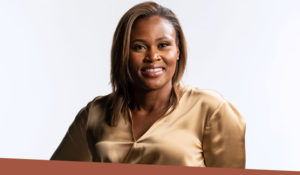MyVU is spotlighting a select group of new faculty for 2019-20. Read more profiles in the series.
By Adrienne Burns
Black feminist scholars. Bessie Smith. James Baldwin. Beyoncé. All have been the subject of Emily Lordi’s academic and public scholarly work.
In publications like The Atlantic and The New Yorker, Lordi’s ability to merge music and literary criticism seems to flow so naturally, you might be surprised to learn that it wasn’t until grad school that she got the idea to merge the two fields. Nevertheless, it’s a fusion that suits her perfectly.
Lordi was a performer as a kid. “I was always singing and dancing and writing songs, and that was a big part of who I was,” she says. But her love of reading and writing led her to an English degree from Vassar College, followed by an immediate jump into graduate school at Columbia University, where she earned a master’s and doctorate in English and comparative literature.
It was at Columbia, studying under her mentor Robert O’Meally and other scholars, that Lordi discovered the project that would drive her career. Studying African American literature sparked an idea in Lordi when she saw the number of writers who invoked black women singers such as Bessie Smith. “I started to realize, there’s a project here—a place where I can enter and engage and read closely, and talk about race, gender, performance and literary criticism,” Lordi says.
“I started to realize, there’s a project here—a place where I can enter and engage and read closely, and talk about race, gender, performance and literary criticism.”
Her work since then has regularly focused on examining music, writing and other cultural practices together. Understanding African American expressive culture—especially in the context of black feminist perspectives and performances—through the details of a performance or a song is where Lordi says she finds the most richness in her work.
Her next book will explore one song: “Home” from the musical The Wiz. The work, Lordi says, is “thinking about what ‘home’ means in the context of mid-1970s African American culture in this post-integration moment of a lot of turmoil and change. And then, too, how the song itself leaves its original home or becomes unmoored from its original context to become this power ballad, show-stopping hit.”
Lordi’s ability to weave her way in and out of music, literature and culture has found its way into the classroom as well. This fall she is teaching an English course titled “Introduction to Literary and Cultural Analysis: What is An Author?” in which students examine how contemporary literary celebrity might complicate the interpretation of an author’s work, as well as a graduate seminar on love and kinship in African American fiction.
Lordi, who is married to new Associate Professor of English Anthony Reed, says she hopes to honor and extend the long tradition of African American scholarship to which her work is indebted, and to do so in a department rich with a tradition of literary criticism. “To be in the company of such incredible scholars is really a privilege,” she says.





